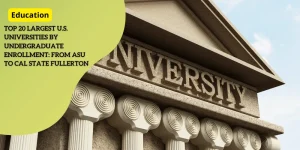Balancing Acts: Elite Academia Navigates Scholarly Rigor and Social Impact

Anúncios
From Ivory Towers to Social Changemakers
Transition to Social Engagement
The Ivy League has long been a symbol of academic excellence. But as society evolves, so must these esteemed institutions. Ivy League universities are increasingly transforming from secluded academic sanctuaries into agents of social change. This shift entails addressing real-world issues head-on, such as climate change, social justice, and public health. The transition represents a significant expansion of their traditional focus on intellectual inquiry and leading-edge research.
Challenges and Balancing Acts
However, this brave new world brings with it distinctive challenges. Balancing rigorous academic pursuits with impactful social engagement is no easy feat. Questions arise on how to integrate societal challenges into academic frameworks without diluting the core mission of educational excellence. Furthermore, there is concern about whether the heightened focus on inclusivity and diversity might come at the expense of scholarly rigor.
Anúncios
Maintaining Academic Excellence
It’s essential that these institutions continue to uphold their foundational commitment to scholarly excellence while expanding their role in societal development. This calls for a strategic approach, ensuring that social impact initiatives organically blend with established academic structures. Cultivating an environment that simultaneously nurtures academic growth and social responsibility is the ultimate goal.
Impact and Accountability
The decisions made within the Ivy League resonate far beyond their campuses. They can influence national policies and shape public opinion. Hence, there’s an increasing demand for transparency, inclusivity, and a commitment to educational equity. The controversies regarding elitism and limited accessibility underscore the necessity for these institutions to widen their reach and ensure a more democratic educational landscape.
Anúncios
Embracing a Comprehensive Model
To stay relevant, Ivy League universities must embrace a comprehensive educational model that goes beyond academics. This involves the integration of critical thinking, soft skills, and practical problem-solving into the curriculum. By doing so, they can create leaders who are not only intellectually rigorous but also adept at navigating the complexities of the modern world.
Navigating the Equilibrium: Academic Excellence and Social Responsibility
Maintaining Academic Rigor with Social Impact Initiatives
To stay relevant, Ivy League institutions must strike a balance between upholding their academic rigor and implementing social impact initiatives. These universities can no longer remain in their “Ivory Towers”; they are increasingly being called upon to address pressing societal issues like climate change, social justice, and inequality. The challenge lies in seamlessly integrating these new responsibilities without compromising on the traditional focus of scholarly pursuits.
Creating an Environment for Intellectual Growth and Social Responsibility
Fostering an environment that nurtures both intellectual growth and social responsibility requires a strategic approach. Workshops, courses, and projects that encourage students to think critically about societal issues while applying academic theories can be instrumental. Universities should aim to produce graduates who are not only knowledgeable but also socially conscious and motivated to effect change.
Strategies for Integration
- Interdisciplinary Courses: By offering courses that intersect different fields, students can gain a more comprehensive understanding of societal issues.
- Community Engagement Programs: Encouraging students to participate in community service can provide practical experience and enhance social responsibility.
- Research with Real-World Applications: Faculty can drive initiatives that focus research efforts on solving current societal problems.
The Broader Impact and Accountability
The decisions made by Ivy League institutions have far-reaching implications. Their policies can influence national and international opinions and set precedents for other educational institutions. As such, these universities are under constant scrutiny. They must prioritize transparency and inclusivity to address concerns over educational equity and diversity.
The Journey Ahead
As we move forward, it’s crucial for Ivy League institutions to redefine their metrics for success. Emphasizing practical skills and adaptability over mere pedigree will be vital in this evolving landscape. Integrating social responsibility with academic excellence will not only maintain the prestige of these institutions but also ensure they remain relevant in shaping the future.
The evolution is ongoing, and success will hinge on these universities’ ability to preserve their academic core while embracing their roles as social changemakers.
“`
The Ivy League’s Influence and Accountability
Extending Beyond Campus: The Broad Impact
The influence of Ivy League decisions stretches far and wide, shaping national and international policies. These universities routinely drive public opinion and inform policy-making through their research, leadership, and engagements. For instance, when a prominent university takes a stand on climate change, it ripples across international arenas, guiding legislation and societal attitudes
Scrutiny and Challenges: Navigating Influence
However, this broad influence comes with rigorous scrutiny. Public and media attention amplify whenever these institutions make significant decisions. The resignation of key leaders, like the recent stepping down of Harvard’s president, always raises eyebrows. Critics point to the sizable influence these universities hold, suggesting it affects educational equity and fuels the formation of an elite class
Transparency and Inclusivity
Amidst this scrutiny, Ivy League schools must prioritize transparency in decision-making and actively engage in dialogues about inclusivity. Transparency ensures trust and fosters a sense of belonging, while inclusivity addresses concerns around diversity and educational fairness
Balancing Academic Excellence and Social Impact
The challenge lies in maintaining their academic rigor while becoming more socially engaged. These institutions must devise ways to integrate social impact within their academic frameworks without compromising scholarly standards. This involves interdisciplinary courses and community engagement initiatives that underscore their dual commitment to scholarly and societal progress
Leadership Accountability
Leadership roles at these universities bear immense responsibility as their decisions impact more than just their campuses. Leaders need to embody the universities’ commitment to both academic rigor and social responsibility. Their actions are often seen as a reflection of institutional values, thus requiring a balance between tradition and innovation
Conclusion
Navigating the delicate balance between influence and accountability is essential for the Ivy League. As they continue shaping the future through both scholarship and societal engagement, these institutions must uphold transparency, inclusivity, and an unwavering dedication to academic excellence
Redefining Success: Skills over Pedigree
The Shifting Job Market
Today’s job market places more emphasis on practical skills and adaptability than on institutional pedigree. While an Ivy League degree was once seen as a ticket to success, the landscape is changing. Employers are increasingly prioritizing candidates who demonstrate critical thinking, creativity, and the ability to solve real-world problems
Breaking the Mold
To meet these new demands, Ivy League institutions are re-evaluating their curricula to include skill-based learning. This shift encourages students to develop competencies that are immediately applicable in their careers. Programs focusing on coding, data science, leadership, and soft skills are becoming more prevalent
Challenging Traditional Notions of Success
The decades-old belief that an Ivy League degree guarantees career success is being questioned. Many argue that skills and experiences, whether gained inside or outside the classroom, are equally—if not more—important. This evolving perception is driving a cultural shift within and outside these prestigious institutions
Adapting to Change
As Ivy League schools adapt, they must balance integrating practical skills with maintaining academic rigor. The goal is to produce graduates who are not only knowledgeable but also equipped to make meaningful contributions in their chosen fields. This holistic approach aims to redefine what it means to be successful in the modern world
- Fostering environments that prioritize intellectual growth and practical skills
- Integrating critical thinking and real-world problem-solving into coursework
- Ensuring inclusivity and transparency in academic and social initiatives
“`
The Future of Elite Education: A Holistic Approach
Integrating Critical Thinking and Soft Skills Development
As we transition into an ever-evolving job market, the demands for graduates are shifting. Employers no longer place primary importance on institutional reputation alone; instead, they prioritize practical skills and critical thinking. Ivy League institutions must, therefore, focus on integrating these vital elements into their curriculum. Courses and programs that challenge students to think critically, engage in problem-solving, and develop soft skills are more important than ever. By making these adjustments, students will be better prepared for real-world challenges and opportunities.
Blending Academic Rigor with Practical Applications
Maintaining academic excellence while incorporating practical applications presents a delicate balancing act. However, it’s achievable through experiential learning opportunities like internships, co-op programs, and community projects. Encouraging students to apply theoretical knowledge in real-world settings enhances their learning experience and societal contributions. This holistic approach ensures that academic rigor is not sacrificed but rather complemented by practical relevance.
Real-World Problem-Solving
Ivy League universities must prioritize courses that emphasize real-world problem-solving. This could involve case studies, group projects, and collaborations with organizations outside the academic setting. By doing so, students will be able to see the immediate impact of their efforts and feel more connected to the subjects they study
- Internships and co-op programs
- Community engagement projects
- Collaborative coursework with external organizations
Fostering a Comprehensive Learning Environment
Institutions should create an environment where intellectual growth and social responsibility are intertwined. Interdisciplinary courses and diverse student bodies can foster a richer educational experience. This inclusive approach ensures that students not only excel academically but also grow as socially responsible individuals who can think broadly and ethically.
By weaving these elements into the educational fabric, Ivy League universities can maintain their prestige while adapting to contemporary needs. This holistic educational model prepares students to thrive in diverse environments, making meaningful contributions to society. “`
Reclaiming Significance: A Return to Academic Excellence
Prioritizing In-depth Scholarship
The Ivy League’s journey towards embracing social impact has been both revolutionary and challenging. However, these esteemed institutions must not lose sight of their original mission: to advance knowledge through rigorous scholarly pursuit. The core of Ivy League education should focus on fostering in-depth scholarship that encourages students to engage in meticulous research and develop expertise in their chosen fields. By upholding high academic standards, these universities can continue to produce groundbreaking research that drives global innovation.
Fostering Critical Thinking
Critical thinking remains a vital skill in this rapidly evolving world. Ivy League institutions need to create an academic environment that challenges students to question assumptions, analyze complex problems, and develop well-founded arguments. Courses should be designed to provoke thought, spark curiosity, and encourage intellectual exploration. This approach not only cultivates independent thinkers but also prepares graduates to navigate the complexities of the modern world effectively.
Nurturing Groundbreaking Research
An emphasis on groundbreaking research is essential for maintaining the Ivy League’s prominence. Universities must continue to provide resources and support for researchers to explore new frontiers and tackle significant global challenges. This involves fostering interdisciplinary collaboration and ensuring access to state-of-the-art facilities. By doing so, Ivy League schools can maintain their status as leaders in academic inquiry and innovation.
Bridging Academia and Real-World Challenges
To set new global standards, Ivy League institutions must bridge the gap between academia and real-world problems. This can be achieved by integrating real-world applications into the curriculum and promoting experiential learning opportunities such as internships, community projects, and partnerships with industry. By aligning academic pursuits with societal needs, these universities can produce graduates who are well-equipped to address pressing global issues.






